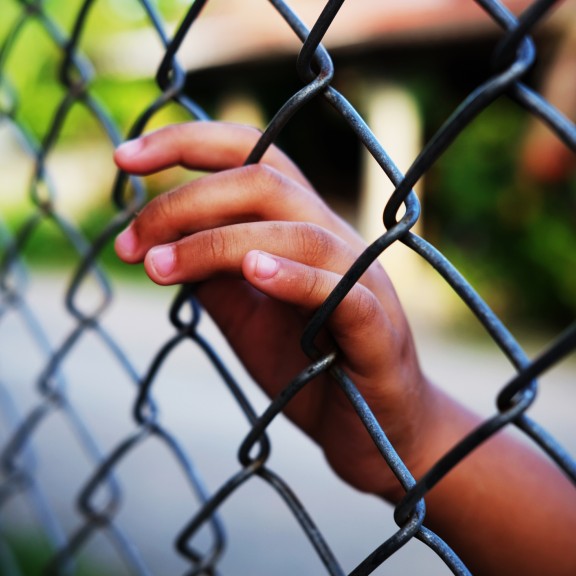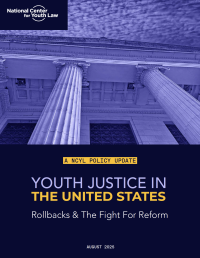Children Sue to Restore Contact Visits in the Adams County Jail, Asserting Their Right to Hug Their Parents
The lawsuit challenges a conspiracy between Adams County and HomeWAV to profit off of the elimination of contact visits
ADAMS COUNTY, Colo. — Children whose parents are jailed in Adams County have sued the County, the Sheriff, and telecommunications company HomeWAV, asking the Colorado state court to affirm their constitutional right to hug their parents. The families allege that the Adams County Sheriff, the Board of County Commissioners, and carceral telecom company HomeWAV conspired to profit off of the elimination of family contact visits at the jail, which have been replaced with high-cost, for-profit phone and video calls. Plaintiffs argue that children have a fundamental right to familial association under the Colorado Constitution: a right to hug their parents. This is the third lawsuit filed as part of the larger Right 2 Hug Project, following two cases in Michigan that were brought last year. This case is being litigated by Public Justice, Civil Rights Corps, Maxted Law, LLC, Spero Justice Center, Singleton Schreiber, LLP and the National Center for Youth Law.
Across the United States, hundreds of jails have eliminated contact visitation. Adams County, Co., which encompasses some of the Denver suburbs and is one of the largest counties in the state, has banned all forms of family visitation in the jail since at least 2006. And the complaint alleges that starting in 2014, the Sheriff, through the Board of County Commissioners, has contracted with private prison telecom companies to profit from the visitation ban.
“For over a decade, children in Adams County have had no way of seeing, hugging, being held by, or touching their incarcerated parents, who could be detained for weeks, months, or even years,” said Alexandra Jordan, a senior attorney for Public Justice’s Debtors’ Prison Project. “Our lawsuit aims to put an end to this visitation ban and the inhumane practice of separating families.”
Nothing can replace contact visitation. “Seeing my dad in person is very important to me. If we could have visits, I could talk to him more about how I’m feeling and make sure he’s okay, too. I worry about him a lot and it makes it worse to not be able to see him. If I could see him in person I would say all the private stuff I want to say but can’t say on the phone. I would give him a big hug and probably suffocate him with my love,” said J.B, a nine-year-old plaintiff.
Colorado courts and the state legislature have affirmed the importance of familial association and in-person visitation, from a 1978 Colorado Supreme Court opinion to recent legislative reforms that support visitation between incarcerated individuals and their children. Indeed, in 2024, the Denver County Sheriff reinstated in-person visitation and acknowledged that in-person visits “keep people connected in a way that a video call just doesn’t allow.”
“Adams County’s visitation ban is contrary to law established by our Supreme Court, state legislature, and even the sheriff of a neighboring county,” said Daniel Meyer, attorney at Spero Justice. “The County must acknowledge the right to familial association and abandon its unconstitutional, profit-driven visitation policies.”
HomeWav, the current vendor for the Adams County Detention Facility, charges families $0.20 per minute for remote video calls and $0.40 to deliver a video message, plus taxes and fees. Since 2020, people with loved ones inside Adams County jail have spent at least $4.8 million on HomeWAV calls.
“Adams County and HomeWav are degrading family bonds for profit. This suit seeks to correct this grievous wrong by restoring the right to in-person, contact visitation,” said Kevin Hannon, Partner at Singleton Schreiber, LLP in Denver.
“Paying to talk to [my son] creates a severe financial strain for my family. Because of the cost of calls to Shawn, I struggle to pay for food and medical care,” said plaintiff Ashlee Trujillo, whose 18-year-old son is detained at the jail. “...every dollar I spend on HomeWAV is money I cannot save towards Shawn’s bond to bring him home.”
The costs of these video and phone calls compound the financial stress that families of people detained at the Adams County Detention Facility experience. Most people in the jail are being detained pretrial, and are therefore legally innocent, and are behind bars solely because they cannot afford to pay cash bail. Incarcerated individuals with the means to pay for their release can go home to their families, while poor families remain separated and are forced to pay exorbitant costs to simply connect with their loved ones. Those individuals pay not only with the time lost, but with their minimal resources going towards these companies just so they can remain in contact with their families, which can contribute to them not being able to afford bail.
“More than one-third of families with incarcerated relatives go into debt to cover the cost of staying in touch, and poor, low-income, Black, and brown families disproportionately bear this financial burden," said Matt Garcia, attorney at Civil Rights Corps. “Meanwhile, the correctional telecommunications industry rakes in billions annually from video and phone calls initiated by people who simply want to remain in touch with their loved ones.”
“By eliminating in-person visits in favor of for-profit video calls, the County, sheriff, jail, and their corporate partner have denied children their fundamental right to family association," said Hong Le, a senior attorney at the National Center for Youth Law. “Profit cannot excuse, let alone justify, the government’s violation of children’s constitutional rights.”
Learn more about the case and find relevant documents HERE.
###
Public Justice takes on the most significant systemic threats to justice of our time—abusive corporate power and predatory practices, the assault on civil rights and liberties, and the destruction of the earth’s sustainability. We link high-impact litigation with strategic communications and the strength of our partnerships to combat these abusive and discriminatory systems and achieve social and economic justice. For more information, visit www.publicjustice.net.
Civil Rights Corps challenges systemic injustice in the U.S. legal system. Through innovative civil rights litigation, advocacy, and public education, we aim to re-sensitize the legal system and our culture to the injustice and brutality that characterizes the contemporary U.S. legal system. Our work is guided by a commitment to the people and communities harmed by policing, surveillance, incarceration, discrimination, and the criminalization of poverty. For more information, visit civilrightscorps.org.
The National Center for Youth Law centers youth through community collaboration, impact litigation, policy advocacy and research to fundamentally transform our nation's approach to education, health, immigration, foster care, and youth justice. Our vision is a world in which every child thrives and has a full and fair opportunity to achieve the future they envision for themselves.
Spero Justice Center works to end mass incarceration in Colorado, focusing on extreme and unjust sentencing practices. In court and at the legislature, Spero fights to replace inhumane, racist, and counter-productive criminal legal policies with alternatives grounded in facts, compassion and hope. For more information, visit www.sperojustice.org.
Singleton Schreiber, LLP is a client-centered law firm, with offices in nine states including Colorado. Singleton Schreiber, LLP combines creative and innovative legal advocacy with a fearless courtroom presentation to protect and safeguard clients’ interests. The firm seeks justice for clients through mass torts and multi-district litigation, class actions, fire litigation, and personal injury and wrongful death, civil rights, toxic torts and environmental law, insurance bad faith, and sex abuse/trafficking litigation. For more information, visit www.singletonschreiber.com.
Maxted Law, LLC is a social justice law firm representing people in high-stakes civil rights and criminal cases, ready to stand firm against abuses of power particularly in police practices and conditions of confinement. Maxted Law, LLC follows a client-centered approach while working to create systemic changes in areas such as policing and carceral institutions. For more information, visit www.maxtedlaw.com.



